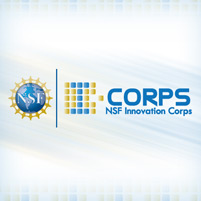I-Corps Innovation

As director of the National Science Foundation (NSF), Dr. Subra Suresh envisioned a program that connected education, infrastructure and research to commercial ideas and concepts related to science, technology, engineering and math.
As Carnegie Mellon University's president, he now gets to see the idea at work. The NSF has awarded a three-year, $300,000 grant to the Carnegie Mellon Center for Innovation and Entrepreneurship (CIE) to create an Innovation Corps (I-Corps) Site. The I-Corps Site will train entrepreneurial faculty and student teams to commercialize research and concepts related to science, technology, engineering and math.
The CMU I-Corps Site's primary goal is to create an efficient and replicable process to commercialize innovations based on customer discovery and product adaptation. The program will incorporate the CIE curriculum combined with curricula from earlier I-Corps programs. It will include four elements: workshops, mentoring, funding for projects and customer discovery, and access to incubator space.
CMU students, faculty and alumni are recognized leaders in producing successful startup companies. According to the Association of University Technology Managers, CMU ranks first among U.S. universities without a medical school in the number of startup companies created per research dollar spent since 2007, and last year CMU produced a record 36 startups.
There are three components of I-Corps: Nodes, Teams and Sites. The nodes serve as hubs for education, infrastructure and research, and deliver the I-Corps curriculum to teams. The I-Corps Sites are academic institutions that engage local teams in transforming their cutting-edge research and great ideas into winning commercial ventures.
The establishment of the CMU I-Corps Site has been a collaboration among several members of the CMU community. The principal investigator on the project is Lenore Blum, co-director of the CIE. Co-PIs are Randal E. Bryant, dean of the School of Computer Science; Robert Dammon, dean of the Tepper School of Business; David Mawhinney, co-director of the CIE; and Robert Wooldridge, director of the Center for Technology Transfer and Enterprise Creation.
As a vehicle for promoting university innovation, entrepreneurship and growth, the I-Corps Site will leverage CMU's acknowledged strength in encouraging and fueling entrepreneurship as well as relationships with internal and external partners in the business community. The objective is to help students and faculty members hone their skills and collaborate with industry, other entrepreneurs and the business community.
The program starts with team building. Each year of the grant, the CIE will recruit two cohorts of 15 teams each from existing entrepreneurial groups, course projects and research labs. Each team will have an entrepreneurial lead, an academic lead and a business mentor. Teams will be encouraged to participate in CIE and other entrepreneurial activities such as venture competitions and showcase events.
Throughout the duration of the program, each team's progress and customer contacts will be tracked and assessed. Surveys will be conducted at the start, midpoint and end of the program to evaluate its development and effectiveness.
The teams will work for six months, at which time they will present their work to a committee of I-Corps Site faculty, staff and advisors, who will evaluate the viability of the business model. The committee will recommend the next steps and ways to improve business tactics. Successful teams will be urged to apply for the NSF I-Corps Teams program, the AlphaLab and AlphaLab/Gear accelerators, and perhaps be invited to present at the next LaunchCMU entrepreneurial showcase. Eligible alumni participants could also apply to the Open Field Entrepreneurs Fund. Once a cohort has finished the 6-month presentations, they will continue to be mentored for another 12 months. During this time it will be determined whether the ventures are promising enough to continue.
Ultimately, the CMU I-Corps Site is aimed at transitioning university research out of the lab into commercial sectors, allowing the public to experience new discoveries and innovations sooner, promoting quick economic growth and better use of resources.
Related Links: Center for Innovation and Entrepreneurship | LaunchCMU | AlphaLab | Open Field Entrepreneurs Fund
